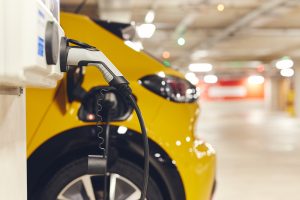The electric vehicle (EV) industry is undergoing a transformative phase, driven by technological advancements aimed at improving battery efficiency, lifespan, and environmental impact. Key developments include adopting interchangeable battery modules and breakthroughs in lithium-sulfur and solid-state battery technologies. These innovations promise to address existing limitations, paving the way for more sustainable and user-friendly EV solutions.
Revolutionizing EV Charging
One of the significant hurdles in EV adoption has been the time-consuming charging process. Interchangeable battery modules, also known as battery swapping, offer a solution by allowing drivers to replace depleted batteries with fully charged ones in minutes. This approach reduces downtime and alleviates concerns about battery degradation over time.
Companies like Ample have developed modular battery systems compatible with various EV models. Their technology enables rapid battery swaps, significantly reducing the waiting period associated with traditional charging methods. In 2023, Stellantis announced plans to implement Ample’s swappable battery modules in its shared EV fleets, marking a substantial step toward mainstream adoption of this technology.
Similarly, China’s Contemporary Amperex Technology Co. Limited (CATL), the world’s largest EV battery manufacturer, has co-developed ten new EV models with swappable batteries. The company aims to build 1,000 battery-swapping stations by next year and establish 10,000 stations in the long term, potentially replacing a third of traditional gas stations in China.
Enhancing Energy Density and Sustainability
Lithium-sulfur (Li-S) batteries have emerged as a promising alternative to conventional lithium-ion batteries. They offer higher energy densities and utilize more abundant and environmentally friendly materials. Recent research indicates that Li-S batteries can achieve energy densities significantly greater than their lithium-ion counterparts, making them ideal for applications requiring lightweight and high-capacity energy storage.
However, challenges such as limited lifespan and cycle stability have hindered their widespread adoption. To address these issues, engineers have developed porous electrodes capable of 25,000 charge cycles while retaining 80% capacity, marking a significant improvement in the durability of Li-S batteries.
Japan’s Idemitsu Kosan plans to construct a large-scale lithium sulfide plant to support the commercialization of all-solid-state batteries. This facility aims to bolster the development of next-generation EVs by providing essential materials for advanced battery technologies.
Solid-state batteries replace the liquid electrolytes found in traditional batteries with solid materials, offering enhanced safety, higher energy density, and longer life cycles. By eliminating the flammable liquid component, these batteries significantly reduce the risk of fires, a critical consideration for EV safety.
Recent studies have highlighted the potential of all-solid-state lithium-sulfur batteries (ASSLSBs) as next-generation energy storage devices. These batteries combine the high energy density of Li-S chemistry with the safety benefits of solid electrolytes, addressing many limitations associated with current lithium-ion batteries.
In the United States, battery start-up Lyten invests over $1 billion to build a lithium-sulfur battery factory in Nevada. This initiative aims to reduce reliance on traditional battery materials, offering a more sustainable and cost-effective solution for the EV market.
The convergence of interchangeable battery modules, lithium-sulfur, and solid-state battery technologies signifies a pivotal shift in the EV industry towards greater sustainability and efficiency. These advancements address current challenges such as charging time, energy density, and safety and pave the way for broader adoption of electric vehicles. As research and development progress, these innovations are poised to transform the future of transportation and energy storage.



